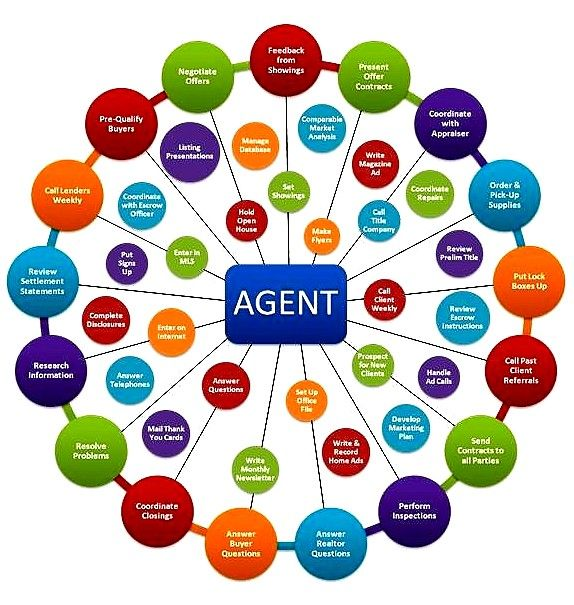Comprehending the Trick Distinctions Between a Real Estate Agent and Real Estate Agents for an Effective Building Transaction
Navigating the complexities of realty transactions demands an understanding of the distinctive functions played by Realtors and realty agents. Although both are licensed experts, the nuances in their certifications and moral commitments can considerably affect the outcome of your home dealings. Realtors, bound by the strict code of principles of the National Organization of Realtors, guarantee a degree of integrity that might not be guaranteed with all property agents. With the possible to influence transparency and settlement efficiency, choosing the best expert comes to be a pivotal decision. But what other elements should be thought about for a smooth deal?
Specifying Real Estate Professionals and Representatives


In the realty industry, comparing a Realtor and a realty agent is critical for recognizing their unique functions and credentials. A genuine estate agent is a professional who has obtained a permit to help customers and sellers in property transactions. They work as intermediaries in the trading of residential or commercial properties, making certain smooth interaction and negotiation between the events involved. Representatives are in charge of detailing residential properties, carrying out market analyses, and assisting clients through the complexities of property purchases, including agreement preparation and closing procedures.
On the various other hand, a Real estate professional is a qualified genuine estate representative that is likewise a participant of the National Association of Realtors (NAR) This membership needs adherence to a rigorous code of principles and specialist criteria, which are made to ensure the highest level of integrity and fairness in all ventures. Real estate professionals typically have access to a wealth of sources, including specialized training and specialist growth possibilities, which can enhance their capacity to serve clients properly. While all Real estate professionals are real estate representatives, not all realty agents are Realtors, making this difference necessary for clients looking for a specialist with a commitment to ethical methods.
Licensing and Credentials
Acquiring a real estate certificate is the foundational action for individuals aspiring to become either a property agent or a Real estate professional. Elizabeth Leanza Synergy Realty Realtor. This procedure commonly involves completing a set number of pre-licensing instructional hours, passing a state-administered test, and satisfying any type of added state-specific requirements. The academic curriculum typically covers crucial subjects such as real estate principles, building laws, contracts, and financing, furnishing prospects with thorough sector expertise
While all Real estate professionals are genuine estate representatives, not all real estate representatives are Realtors. The difference depends on the added certifications that Realtors have. To come to be a Real estate agent, an accredited realty representative have to sign up with the National Association of Realtors (NAR), which calls for adherence to a rigorous collection of requirements and completion of further education and learning. This subscription is not a requirement for exercising as a property representative, however it provides enhanced expert integrity and accessibility to a substantial network of property experts.
Honest Specifications and Codes
Maintaining ethical requirements is a keystone of expert method in the property industry. These criteria differentiate a Real estate agent from a general genuine estate representative, impacting exactly how they carry out service. Realtors, participants of the National Association of Realtors (NAR), comply with a rigorous Code of Ethics, developed in 1913, which mandates honesty, honesty, and expertise. This code contains 17 posts focusing on obligations to clients, the general public, and other Real estate agents, covering concerns like client privacy, sincere advertising and marketing, and reasonable treatment.
On the other hand, property agents should adhere to state licensing legislations, which supply a standard of moral behavior yet may not be as detailed or strict as the NAR's Code of Ethics. While representatives are bound to run legitimately and fairly, the absence of a generally used ethical code can result in variability in method requirements.
For customers, recognizing these distinctions is critical - Elizabeth Leanza Synergy Realty Realtor. A Realtor's commitment to a higher ethical requirement can provide added guarantee of professionalism and reliability and liability. When selecting in between a Real estate professional and a real estate representative, acknowledging the significance of ethicalities can guide customers toward an expert that lines up with their assumptions for honest conduct in building purchases

Influence On Purchases
Comprehending the honest criteria that Realtors stick to gives a foundation for analyzing their effect on genuine estate deals. Realtors, go to this website as members of the National Association of Realtors (NAR), are bound by a stringent Code of Ethics, which substantially influences their communications and settlements in building deals.
The Real estate professional's commitment to ethical requirements translates right into a more expert and reliable service, commonly resulting in quicker and a lot more efficient transactions. Their obligation to act in the most effective rate of interests of their clients can cause far better end results, such as protecting favorable terms or identifying possible concerns early while doing so. In addition, Real estate agents are geared up with comprehensive market expertise and sources, reinforcing their ability to browse complex deals adeptly.
On the other hand, realty agents who are not Realtors may not be bound by the same stringent moral standards. This distinction can influence the transaction procedure, potentially presenting variability in service quality and customer complete satisfaction degrees. Elizabeth Leanza Synergy Realty Realtor. Ultimately, the impact of a Realtor's honest commitment can be considerable, promoting favorable experiences and successful building transactions
Choosing the Right Professional
Selecting the ideal realty specialist is a vital action in making sure an effective building deal. The choice in between a Real estate professional and a find more info property representative depends upon a number of variables, including the particular requirements of the transaction and the degree of knowledge needed. Real estate agents are members of the National Organization of Realtors (NAR) and comply with a rigorous code of values, which might be beneficial for customers seeking a professional bound by enhanced ethical requirements. This association can give an additional layer of trust fund and assurance in the handling of complex transactions.
On the various other hand, realty agents who are not Realtors can still use high degrees of service and expertise. Their abilities and experience ought to be evaluated based on their performance history, regional market expertise, and customer reviews. When choosing in between these specialists, consider their knowledge with the kind of property included and their arrangement skills, which are important for achieving favorable terms.
Inevitably, the choice needs to be educated by thorough research and personal interviews to assess compatibility and interaction style. This guarantees that the chosen expert aligns with the client's objectives and expectations, paving the method for a seamless residential or commercial property deal.

Conclusion
In summary, distinguishing in between Realtors and genuine estate representatives is vital for navigating home deals properly. Picking a Real estate professional can significantly enhance the general experience and self-confidence in check my source the purchasing or offering process, ultimately contributing to even more effective residential or commercial property negotiations.